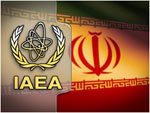 Reuters: Iran said progress was made in Thursday’s talks in Tehran with senior U.N. nuclear inspectors but gave no details other than they would meet again in mid-January.
Reuters: Iran said progress was made in Thursday’s talks in Tehran with senior U.N. nuclear inspectors but gave no details other than they would meet again in mid-January.  DUBAI (Reuters) – Iran said progress was made in Thursday’s talks in Tehran with senior U.N. nuclear inspectors but gave no details other than they would meet again in mid-January.
DUBAI (Reuters) – Iran said progress was made in Thursday’s talks in Tehran with senior U.N. nuclear inspectors but gave no details other than they would meet again in mid-January.
There was no immediate comment from the U.N. International Atomic Energy Agency (IAEA) about the one-day meeting over Iran’s disputed nuclear program, and no sign its inspectors would gain access to the Parchin military complex as requested.
The agency believes Iran has conducted explosives tests with possible nuclear applications at Parchin, a sprawling facility southeast of Tehran, and has repeatedly asked for access.
The talks were the first between the U.N. agency and Iran since August and the outcome could give some indication whether Iran – which denies it wants to develop atom bombs – is any more willing to address international concerns over its nuclear work after U.S. President Barack Obama’s re-election last month.
In the latest sign of how Washington is ratcheting up the pressure on Iran, the United States imposed sanctions on Thursday on seven companies and five individuals that it said provided support to the Islamic state’s nuclear program.
The U.S. Treasury Department said the action would bar those companies and individuals from doing business with U.S. firms or citizens, and freeze any assets they have in the United States.
U.S. ally Israel – believed to have the Middle East’s only nuclear arsenal – has threatened military action if diplomacy and economic sanctions intended to halt Iran’s uranium enrichment activities fail to resolve the long-standing dispute.
After previous rounds of talks between the U.N. agency and Iran this year – which did not yield any breakthrough on a long-stalled IAEA investigation into suspected atom bomb research – the two sides often gave different versions of events.
One Western diplomat in Vienna, commenting on the Iranian media reports, said on Thursday one of the IAEA’s main goals in this week’s talks had been to visit Parchin and this did not appear to have been achieved.
NEW PARCHIN “LAYOUT”?
Iran’s ambassador to the IAEA, Ali Asghar Soltanieh said progress had been made, official media reported, without giving any examples of concrete steps forward.
“Intensive negotiations were held … There was good progress made. The two sides agreed to hold the next round of talks on January 16 in Tehran,” IRNA news agency quoted him as saying.
The U.N. team was expected to return to Vienna on Friday.
The IAEA wants an agreement that would enable its inspectors to visit Parchin and other sites that it suspects may be linked to what it has called the “possible military dimensions” to Iran’s nuclear program.
Iran says Parchin is a conventional military site and has dismissed allegations that it has tried to clean up the site before any visit.
Western diplomats say Iran has carried out extensive work at Parchin over the past year – including demolition of buildings and removal of soil – to cleanse it of any traces of illicit activity. But the IAEA said a visit would still be “useful”.
A U.S. think-tank said late on Wednesday that new satellite imagery showed “what appears to be the ‘reconstruction’ phase” of the site at Parchin that the IAEA wants to see, following “considerable alterations” there earlier in the year.
“A new site layout is taking shape and the presence of dirt piles and a considerable number of earth-moving vehicles and cars suggest that construction is continuing at a steady pace,” the Institute for Science and International Security said.
The IAEA’s meetings with Iran are separate from – but closely linked to – broader efforts by six world powers to resolve the decade-long nuclear dispute.
On Wednesday, senior European Union and Iranian diplomats discussed the timing of possible new talks between Iran and Britain, France, Germany, United States, Russia and China.
The powers want Iran to curb its uranium enrichment program – work which can have both military and civilian purposes – and cooperate fully with the IAEA. Iran wants the West to lift sanctions hurting its oil-dependent economy.
(Reporting by Zahra Hosseinian and Fredrik Dahl; Editing by Alison Williams)


